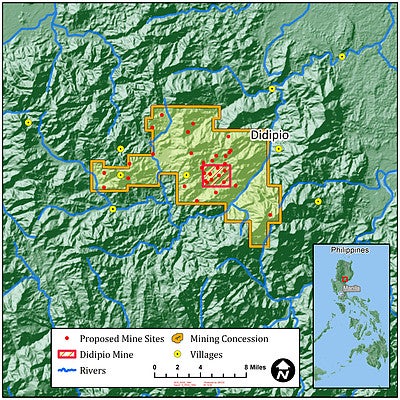The recent visit of Commission on Human Rights Chairperson Leila de Lima in Didipio last 05 November is commendable and shows seriousness and sincerity on the part of the commission to undertake a top level investigation with regards to complaints of human rights violations committed by OceanaGold Philippines Inc (OceanaGold) against the indigenous peoples’ residents of Barangay Didipio, Kasibu, Nueva Vizcaya.
The chair of the Philippine Commission on Human Rights has spoken out against the OceanGold mine construction that is threatening Indigenous residents of Didipio—the focus of a Cultural Survival Global Response campaign. “It’s time to put an end to this,” said Leila M. De Lima. The ongoing conflict escalated into violence when more than 100 Philippine National Police officers used teargas and truncheons to break up a human barricade on October 1, 2009.
KASIBU, Nueva Vizcaya (NV)– Alyansa Tigil Mina (ATM), an advocacy group and a people’s movement composed of more than eighty (80) organizations from mining-affected communities and civil society organizations nationwide, condemns the illegal demolition and violent dispersal of the residents from communities, which hosts an Australian mining company owned by OceanaGold Corp. Inc. (OGPI). The incident happened last October 2 in Barangay Didipio, where OGPI’s Financial or Technical Assistance Agreement (FTAA) covers 23 barangays in the Municipality of Kasibu.
The bad new is that the repressive tactics of Philippine National Police are increasingly violent against the Indigenous people of Didipio who are trying to prevent further demolitions of their homes by the mining company, OceanaGold Philippines, Inc (OGPI). A mobile unit of the National Police is now stationed inside the offices of OGPI, clearing signaling the people that their government stands with the mining company and against them.
Nueva Vizcaya -- An alarming situation continues in the upland village of Didipio, in the province of Nueva Vizcaya, where Ifugao indigenous peoples live. Homes of Ifugaos known for their anti-mining sentiments were searched without warrants by security personnel of a mining company.
Mrs. Gloria Macapagal-Arroyo, President
Republic of the Philippines
Malacanang Palace
JP Laurel Street, San Miguel
Manila 1005 PHILIPPINES
Fax: +63 2 736 1010
E-mail: corres@op.gov.ph
Atty. Eugenio A. Insigne, Chairman
National Commission on Indigenous Peoples (NCIP)
2nd Floor N. dela Merced Building,
Cor. West and Quezon Avenues,
Quezon City, Metro Manila, PHILIPPINES
Indigenous Peoples of the Philippines say:
“Help us Protect our Lands, Homes, and Rivers”
 Map by Julien KatchinoffAmong remote Indigenous communities in the modern world, Didipio is a success story, both for what the people have made of their land and community and for the
Map by Julien KatchinoffAmong remote Indigenous communities in the modern world, Didipio is a success story, both for what the people have made of their land and community and for the
 There is still a chance to stop the Didipio mine before operations begin and the worst environmental effects are felt. Before mine waste can flood their valley, the Didipio Earth Savers Association wants to generate a flood of international letters to convince the government to recognize their rights and stop the mine.
There is still a chance to stop the Didipio mine before operations begin and the worst environmental effects are felt. Before mine waste can flood their valley, the Didipio Earth Savers Association wants to generate a flood of international letters to convince the government to recognize their rights and stop the mine.
In August, during the UN Committee on the Elimination of Racial Discrimination’s (CERD) 75th Session, Colombia, Peru, and the Philippines were among the states that were reviewed for their adherence to and implementation of the UN Convention on the Elimination of Racial Discrimination. CERD raised many concerns about ongoing discrimination against Indigenous Peoples and made concrete recommendations on how the three states can improve their record in its Concluding Observations.